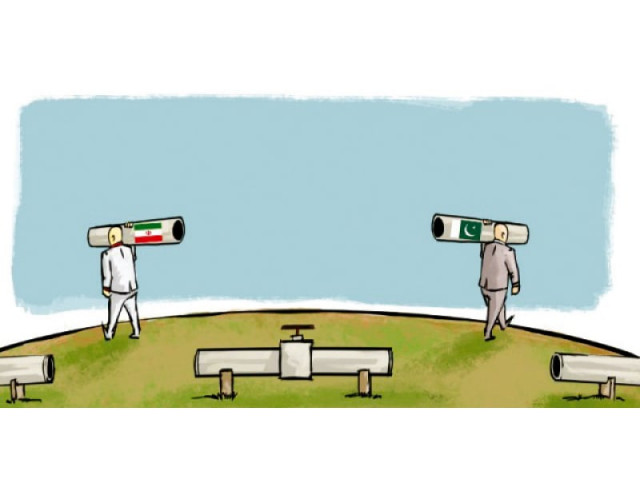Deal under cloud: Govt declares force majeure on Iran pipeline project
Step taken to avoid penalties for delay in construction work.

The move may spark legal wrangling between the two countries over a project conceived years ago to bridge the widening gap between demand and supply of energy in Pakistan. ILLUSTRATION: JAMAL KHURSHID
The government has issued a ‘force majeure and excusing event notice’ in connection with the Iran-Pakistan (IP) gas pipeline as a precaution to stave off hefty penalties, saying the project could not be pushed through in the face of US refusal to exempt it from sanctions, sources say.
The move may spark legal wrangling between the two countries over a project conceived years ago to bridge the widening gap between demand and supply of energy in Pakistan.
Under an agreement, Pakistan is bound to pay a penalty of $3 million per day if it fails to finish the project by the deadline of December 2014.
The notice has been sent ahead of Prime Minister Nawaz Sharif’s crucial visit to Iran starting May 11 during which the pipeline project will feature among other important matters.
However, Iran has been insisting all along that the pipeline could be constructed despite the risk of US curbs and points out that Pakistan was fully aware of the geopolitical situation at the time of signing the deal.
“The government has declared force majeure, which is usually enforced in war or emergencies, because it is unavoidable,” a Foreign Office official told The Express Tribune, but asked not to be named.
Officials believe if Pakistan pressed ahead with the project, it could invite US sanctions and said Iran had also been told about Islamabad’s inability to make progress in this situation.
Soon after coming to power in June last year, the present government had reviewed the gas import project in an inter-ministerial meeting held on July 22, 2013 under the chairmanship of adviser to prime minister on national security and foreign affairs.
It was decided in the meeting that exemption should be sought from the US and a document covering legal and political aspects would be handed over to the US secretary of state during his visit in July 2013.
It was also agreed that Iran’s response to any suggested sovereign framework including timelines and procedural matters should be gauged.
Later, the document covering legal and political aspects was given to Secretary of State John Kerry, but he refused to commit any concessions, officials said.
Pakistan had also told Iran about a raft of measures taken to complete the project on time. However, after failure to arrange finances, the steering committee of the Economic Coordination Committee (ECC) in a meeting held in May 2012 called for exploring the possibility of a state-to-state arrangement, officials said.
The two countries initialled a government-to-government cooperation agreement on December 1, 2012. Under the agreement, the Iranian government nominated Tadbir Energy as the engineering, procurement and construction (EPC) contractor and offered a loan of $500 million. The rest of the financing was to be arranged by Pakistan.
As a result, presidents of Pakistan and Iran performed ground-breaking of the project on the border to mark the beginning of construction work in Pakistan. However, officials said, the new Iranian government backed out of the financing offer and the contract with Tadbir was terminated.
Published in The Express Tribune, May 10th, 2014.
Like Business on Facebook, follow @TribuneBiz on Twitter to stay informed and join in the conversation.


















COMMENTS
Comments are moderated and generally will be posted if they are on-topic and not abusive.
For more information, please see our Comments FAQ